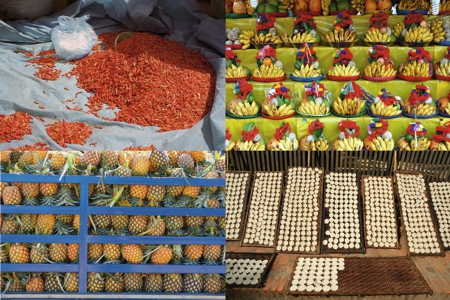[vc_row][vc_column][vc_column_text]
Investing in Food Security & Food Markets in Africa
[/vc_column_text][/vc_column][/vc_row][vc_row][vc_column width=”2/3″][vc_column_text]
 Image: Peet Hiddink
Image: Peet Hiddink
The recent G20 in Chicago emphasized the importance and urgency of global food security. Africa is emerging as the potential giant in the world food supply: it is the only continent with opportunities for mayor increases in cropping area and productivity. This outlook is already changing the economic and (geo-)political status of the continent. This conference focuses on the new modalities of cooperation involving the (local) private sector and how the concessionary funds of development cooperation can best be allocated. The aims and goals of all partners involved – public sector, private sector, scientists and NGOs, from Africa and from outside Africa – do not necessarily coincide. What are the possibilities, challenges, and lessons learned from investing in agricultural development in Africa, also with regard to fostering its sustainable development and its food security?
The recent G20 in Chicago emphasized the importance and urgency of global food security. Africa is emerging as the potential giant in the world food supply: it is the only continent with opportunities for mayor increases in cropping area and productivity. This outlook is already changing the economic and (geo-)political status of the continent. This conference focuses on the new modalities of cooperation involving the (local) private sector and how the concessionary funds of development cooperat
Marcia Luyten
In whose food security are we interested? The Chineseâ??s of the Sudaneseâ??s? The contradiction is that Africa is the most food insecure country, and due to its land area it has the largest potential for food production as business opportunity.
Distribution is a major problem: logistics and politics are hindrances (Dutch Minister of Development Cooperation Ben Knapen has reserved millions for improving logistics!).
How can the needy get their share?
Ton Dietz
Presents a poster on the food situation in Africa, produced by the ASC.
In many countries (from the group of 10 preferred receivers for the Dutch Government), food production is growing faster than the growth of the population. Nigeria is especially booming. For two, Burundi and Kenya, the situation is alarming. Urban growth is higher than the total population growth. Food production has to face up to the urban explosion.
Trends:
» Growing population;
» Africa realises an even higher growth in food production;
» Export of food is growing, but this is in the segment of luxury foods (green beans, e.g.), animal food, and basic foods.
» Import of basic foods has grown, at higher prices than the peak of 2007;
» In most countries people have per person more food available;
» Access (both equal access and minimum access) to food is a problem â?? the rural and urban poor have less to eat;
» Urban food demand is growing enormously.
West Africa is dominated by Nigeria, where farmers have been able to cope with food demand in the urban centres, despite the political problems in the country. The middle class that has come up in the urban centres organises itself better logistics; the governmentâ??s role here is limited to cutting the red tape, and making better prices for farmers possible (keeping prices low is a counterproductive policy).
Improving food security is not only about improving food production and value chains. It is also about public-private partnerships to improve agrohubs: knowledge and support clusters in and around the big cities. And it is about separate policies to reach the poor, both in more marginal rural areas, but also in the cities
Schmitz
Africa is not a continent of problems; it is a continent of opportunities. The image we have of Africa must be corrected. One third of African countries have growth numbers that equal those of Asian countries.
Demand for agricultural goods has increased, and that leads to new opportunities. The FAO expects a doubling of demand for food by 2050, and Africa has a high potential for realizing this production. The private sector is necessary here, we need innovative capacity.
For development cooperation the following is important:
» Dialogue between the government and the private sector;
» Transparency, an open debate about reform and inclusion of the private sector;
» Education and training, responsive to the needs of the labour market;
» Responsible investments in land.
More money is needed for Africa, and also a new policy framework. The Horn of Africa has shown that long term investing in agriculture is mandatory and will have results. Local projects or single products approaches do not work; a broad approach to agriculture together with businesses makes a difference.
Rabbinge
The availability of food is much better than ever before, except for Sub-Sahara Africa where population outgrows production. Hunger and obesity at the same time show that access to food is a problem. A growing middle class also causes a change in diet: more animal products, which increases the demand for crops. A (new) Green revolution is necessary â?? the lack of a green revolution is a major reason that Africa is lagging behind.
Why is Africa lagging behind?
Study by Inter Academy Council â??Realizing the promise and potential of African agricultureâ??
» Weathered soils
» Erratic rainfall
» Endemic plant and animal diseases
» Absence of one dominating crops, and a multitude of farming systems, thus a need for many different technologies
» Dominant role for women â?? limited access to resources
» Land and Labor productivity is low
» Lack of investment in agricultural research
» Lack of knowledge infrastructure
» Lack of functioning academic institutions
» Brain drain
» GDP & Investments in agriculture
» Not functioning local and regional markets
» Land entitlement inappropriate
» No stimulating political and economic environment
» Inadequate capacity to impact global policy formulation
» Lack of good governance
So there is a clear need for investment in research and education, and for renewal of institutional arrangements.
IAC report: Strategic Recommendations
Technology options that can make a difference;
Building impact-oriented research, knowledge and development institutions;
Creating and retaining a new generation of agricultural scientists;
Markets and policies to make the poor prosperous and food secure;
Increase investments in agriculture and infrastructure.
Discussion
Post-harvest loss: look at the whole value chain
There is a wide agreement that subsidies have to be ended, but it is still difficult to take that to Brussels.
Land grabbing is not only negative, it can be a vehicle for further investments; just saying â??Noâ?? is not realistic, there have to be good rules.
Rijk Zwaan and Unilever are companies that work in Africa getting better seeds and better conditions for the workers.
De Boer
Cluster approach
Clusters are â??geographic concentrations of interconnected companies, specialized suppliers, service providers, and associated institutions in a particular fieldâ?? (Porter, 1998). So, work with knowledge centres, academics, and businesses together in a specific area so that mutual support and exchange is possible.
Clustering is good for businesses. Enterprises in the cluster together do better than those who are not part of the cluster. Reasons are, a. o., the availability of a skilled labor force and of specialized service suppliers, improved market access, and better circulation of information.
These clusters are Comparable to the â??Top Sector Policyâ?? of the Netherlands, and the clusters around Schiphol Airport and the Rotterdam Harbour.
Experiences with these clusters in Africa include the corridors in Mozambique and Tanzania, the cluster development by On the Frontiers (Porter) in Rwanda, and the Round Table Africa, an initiative of Maastricht School of Management.
Challenges for businesses are
» Keeping up with the knowledge revolution and increasing global competition
» Lack of critical mass of skills and talent
» Weak links between businesses and knowledge institutions
» Weak governmental, institutional support
» Failure to meet international standards
The Round Table Africa tries to address these issues. Its elements are:
» To stimulate sustainable business by linking research with business development (link macro-micro) in East Africa
» A Focus on MBA and PhD students (public and commercial funding)
» A programme of MsM and ESAMI
» Four steps (linkages): Education, Research (Gov.-Value Chain analysis), Round Tables (Africa- Europe), Projects (Business)
Results after 6 years
» 50 PhD/ DBA students from Africa enrolled
» 50 different kinds of business-research such as:
o business community partnership (horticulture, Tanzania)
o The role of the middleman (potatoes in Kenya)
o Agro-input subsidy packages in Tanzania
o EAC trade hurdles for the agro-sector
» Different projects (SME agro-bank, Association of oilseed-producers, Waste management system for the Serengeti, etc.)
So did we link Dutch investors with African businesses? That proved to be difficult for us in the end, to be honest. As a knowledge institute we are good in education, research; other skills we have to develop further, or seek matching partners.
Piet Heemskerk
Africa Business Academy started to tackle agro business in Africa and The Netherlands. Pointing at the government is not the right way; the idea is to create a community of best practices where one can also share problems and solutions.
The intended impact on society:
Entrepreneurial spirit as a driving force for African development;
SMEs as business leaders and role models;
Growing from small to medium-scale agribusiness firms;
Market access through improved agribusiness chain linkages;
Enhanced incomes, (urban) food security, less hunger.
Panel Verburg
Do Dutch companies participate in German agro food policies? Schmitz will find out.
AAA-rating is not necessary for doing business; you need people who have knowledge about agro business.
Voluntary guidelines in agro? It is a first step, the next is to implement guidelines on a global level, start monitoring and capacity building in countries and legal institutions. Name and Shame has to go together with Name and Fame.
More publicity around these opportunities, too much stays below the radar.
Summary by Jos van Gennip
Could there be the momentum now to come up with a master plan for Africa?
Improving food security:
» local ownership and foreign investments;
» supply and access;
» public and private (government has a task; private sector to take its own initiative);
» Investment versus land grabbing;
» dealing with growing urban demand and global demand.[/vc_column_text][/vc_column][vc_column width=”1/3″][vc_column_text]FoodFIRST/Floriade conference
This conference is organised as part of AFIF2012.
Moderator: Marcia Luyten
Report: Hans Groen (foodFIRST)[/vc_column_text][/vc_column][/vc_row]
